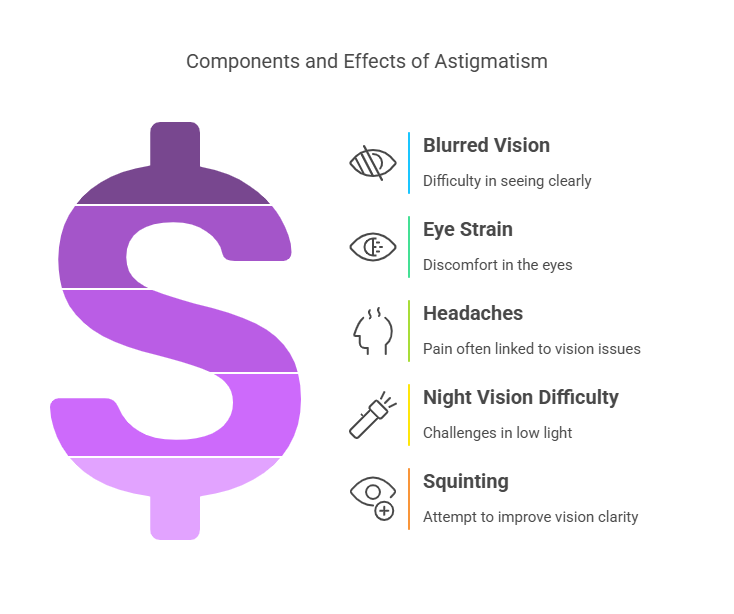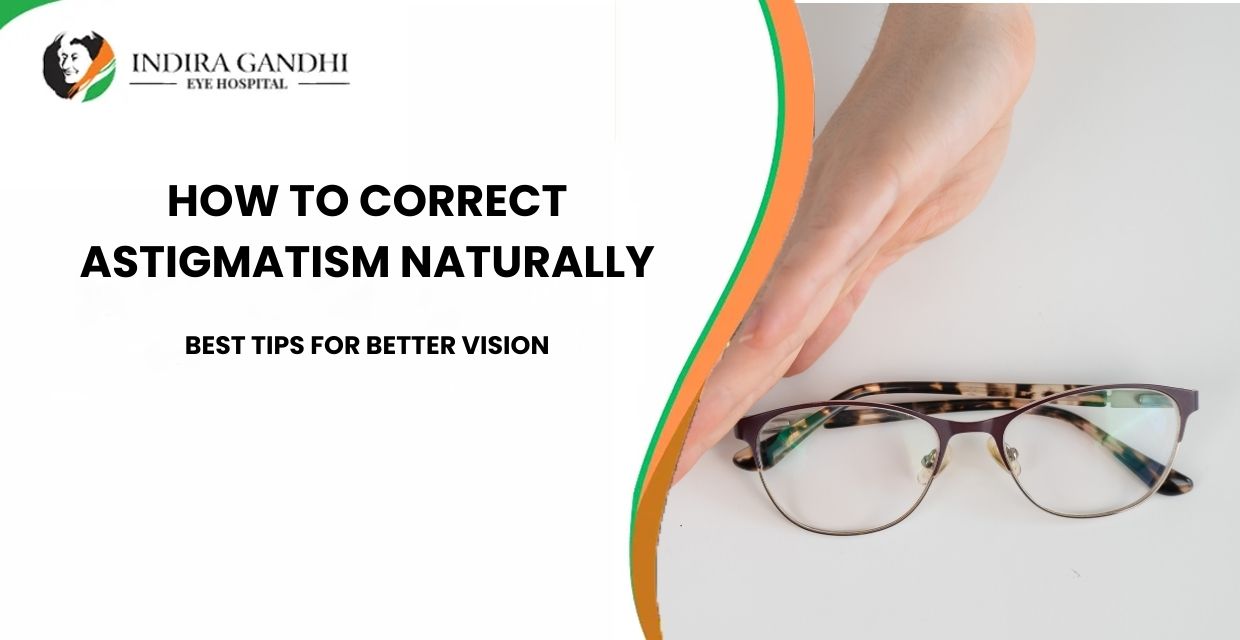|
Getting your Trinity Audio player ready...
|
Astigmatism is one of the most common refractive errors of the eye, causing blurry or distorted vision due to an irregular shape of the cornea or lens. It can make tasks like reading, driving, or even looking at a clock quite challenging. While corrective lenses such as glasses or contact lenses are typically prescribed for astigmatism, many people are interested in learning if there are natural ways to improve their vision.
At Indira Gandhi Eye Hospital, we understand the importance of clear vision for your everyday life. While natural remedies alone may not eliminate the need for glasses or contact lenses, some techniques and lifestyle changes can help you manage astigmatism better and support overall eye health. In this blog, we’ll explore the best tips for naturally improving your vision if you have astigmatism.
Understanding Astigmatism: A Quick Overview

Astigmatism occurs when the cornea or lens of the eye is not evenly curved. Instead of being round, the cornea or lens might be shaped more like a football. This irregular shape prevents light from focusing properly on the retina, the light-sensitive part at the back of your eye. As a result, you might experience blurry or distorted vision at both near and far distances.
Some common signs of astigmatism include:
- Blurred or distorted vision
- Eye strain and discomfort
- Headaches
- Difficulty seeing at night
- Squinting to see better
Astigmatism is usually corrected with glasses or contact lenses. However, there are natural methods you can incorporate into your daily routine to help improve your eye health and reduce some symptoms of astigmatism.
1. Eye Exercises for Astigmatism
Regular eye exercises can help improve the strength and flexibility of the eye muscles, which may reduce the strain associated with astigmatism. These exercises can also support your eye’s ability to focus on both near and distant objects, helping to ease symptoms like blurred vision or discomfort.
Some effective eye exercises include:
- Palming: This exercise helps relax the eye muscles and relieve stress. Simply close your eyes, rub your palms together to warm them up, and gently cup them over your closed eyes for 30 seconds. The warmth and darkness promote relaxation.
- Focus Shifting: Hold your finger or a small object about 6 inches from your face, then slowly shift your focus to an object 10-15 feet away. Move your gaze back and forth between the near and far objects for a few minutes. This helps improve your eye’s focusing ability.
- Figure 8 Exercise: Imagine a large figure 8 in front of you and trace it with your eyes. This exercise helps improve the movement and coordination of the eye muscles.
While these exercises won’t correct astigmatism on their own, they can improve eye comfort and reduce strain, which may help alleviate some symptoms.
2. Maintaining Proper Eye Hygiene
Proper eye hygiene is essential for maintaining eye health and preventing conditions that can worsen astigmatism. Keeping your eyes clean and well-maintained can reduce irritation, dryness, and discomfort.
Simple eye hygiene tips include:
- Wash your hands regularly: Clean hands reduce the risk of infection, especially when handling contact lenses or touching your eyes.
- Use lubricating eye drops: If you experience dryness or irritation, using preservative-free artificial tears can help keep your eyes moist and comfortable.
- Avoid rubbing your eyes: Rubbing can cause irritation and introduce bacteria, which may lead to infections and further discomfort.
3. Eating a Healthy Diet for Eye Health

A healthy diet rich in vitamins and minerals can have a significant impact on eye health. Foods high in antioxidants, vitamins, and minerals support the health of the retina and reduce inflammation in the eye, which can be beneficial for people with astigmatism.
Some key nutrients to include in your diet for better eye health include:
- Vitamin A: Found in foods like carrots, sweet potatoes, and spinach, vitamin A is essential for maintaining good vision and supporting the retina.
- Vitamin C: Found in citrus fruits, strawberries, and bell peppers, vitamin C is an antioxidant that helps protect the eyes from damage caused by free radicals.
- Vitamin E: Found in nuts, seeds, and green leafy vegetables, vitamin E supports healthy cell function and protects the eyes from oxidative stress.
- Omega-3 Fatty Acids: Found in fatty fish like salmon and walnuts, omega-3s are important for maintaining the health of the retina and may help reduce the risk of macular degeneration.
- Zinc: Found in foods like oysters, pumpkin seeds, and beans, zinc is crucial for proper eye function and can help prevent age-related vision problems.
Eating a balanced diet with a focus on these nutrients will not only improve your eye health but may also help manage the symptoms of astigmatism.
4. Reducing Screen Time
With the increase in screen time due to work, school, and entertainment, many people experience eye strain and discomfort, which can worsen the symptoms of astigmatism. The blue light emitted by screens can contribute to digital eye strain, which may lead to blurry vision, headaches, and dry eyes.
To reduce eye strain caused by screens, follow these tips:
- Take regular breaks: Use the 20-20-20 rule. Every 20 minutes, take a 20-second break and look at something 20 feet away. This will give your eyes a chance to relax and refocus.
- Adjust your screen settings: Reduce the brightness and increase the text size to make reading easier on your eyes.
- Position your screen correctly: Keep your screen about 20-30 inches away from your eyes and make sure it is at eye level to reduce strain.
- Use blue light filters: Blue light filters or screen protectors can help reduce the harmful effects of blue light and make screens more comfortable to look at for extended periods.
5. Using Proper Lighting
Proper lighting is important for reducing eye strain and supporting good vision. Poor lighting can force your eyes to work harder, leading to discomfort, headaches, and blurred vision.
- Use natural light whenever possible: Natural light is the best for reducing strain. Position yourself near windows or use natural lighting to read or work.
- Use adequate task lighting: When reading or working, ensure that your workspace is well-lit with soft, even lighting. Avoid glare from overhead lights or direct sunlight on your screen.
By using proper lighting, you can help your eyes focus more easily and reduce the discomfort associated with astigmatism.
6. Getting Regular Eye Exams
While these natural tips can improve your eye health, regular eye exams with a qualified ophthalmologist are essential for managing astigmatism. At Indira Gandhi Eye Hospital, we recommend that individuals with astigmatism schedule regular eye exams to monitor changes in their vision and ensure the proper treatment plan is in place.
Eye exams are crucial for detecting early signs of vision problems and ensuring that your prescription is up to date. Even if you’re using natural methods to support your eye health, it’s important to follow up with your doctor regularly to maintain clear vision and eye comfort.
7. Consider Vision Therapy
In some cases, vision therapy can help improve the coordination and focusing ability of the eyes. Vision therapy is a series of exercises and activities designed to improve eye movement and focusing skills. It is often used to treat conditions like amblyopia (lazy eye) or strabismus (crossed eyes), but it may also help alleviate some symptoms of astigmatism.
If you’re interested in vision therapy, consult with an eye care professional at Indira Gandhi Eye Hospital. We can assess your condition and recommend the most appropriate treatment options for your needs.
Conclusion: Take Charge of Your Eye Health with Indira Gandhi Eye Hospital
While there is no natural cure for astigmatism, there are several lifestyle changes and techniques that can improve your eye health and help alleviate the symptoms of the condition. Eye exercises, a healthy diet, reducing screen time, and using proper lighting can all support better vision and reduce discomfort.
If you’re experiencing symptoms of astigmatism or other vision problems, it’s important to consult with an eye care professional for a comprehensive eye exam. At Indira Gandhi Eye Hospital, our team of experienced ophthalmologists is dedicated to providing the best care for your eyes. We offer a wide range of services to help you maintain healthy vision, from routine eye exams to advanced treatments for astigmatism.












